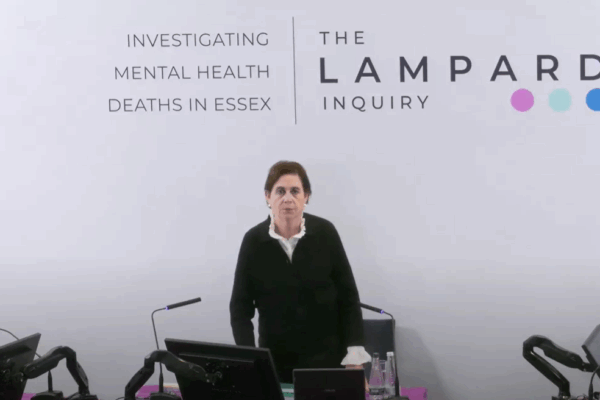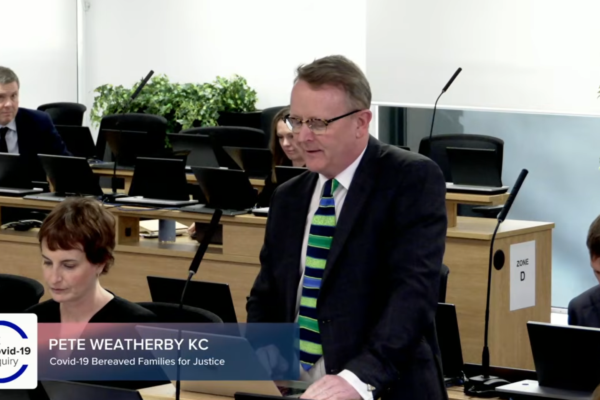Covid-19 Inquiry: Module 6 hears about “forced” discharging of hospital patients without testing and “generational slaughter” in care homes
1 August 2025

Garden Court North’s Pete Weatherby KC (pictured) asks questions of former Health Secretary Matt Hancock on 2 July, 2025. Credit: Covid-19 Inquiry / YouTube.
Yesterday (31 July 2025), public hearings concluded for Module 6 of the Covid-19 Inquiry, which overwhelmingly heard how a lack of preparedness and a lack of parity between Health and Social Care led to a fatal lack of protection for the adult social care sector during the pandemic.
In the words of Garden Court North’s Pete Weatherby KC in his opening submission on 30 June on behalf of the Covid-19 Bereaved Families For Justice (CBFFJ) UK, the “generational slaughter within care homes” in the early days of the pandemic is a phrase that “chimes with the experience of thousands of our families”.
The phrase, which came from senior civil servant and former Department of Health and Social Care worker Alasdair Donaldson in his evidence to the Inquiry, refers to the nearly 46,000 care home residents who died from Covid-19 in England and Wales between March 2020 and January 2022, many of them in the early weeks of the pandemic.
In no small part, such loss was contributed to by the NHS’ decision to discharge untested patients from hospitals into care homes, a policy later ruled unlawful in a High Court judgement.
Infected patients “forced” on care homes
On 16 July, Garden Court North’s Anna Morris KC asked questions of Caroline Abrahams, Charity Director of Age UK.
Ms Abrahams agreed unreservedly that it was a “fundamental failure of government at the outset of the pandemic to allow discharge of patients from hospital into care settings without confirmation by way of a negative test”.
Age UK, a leading charity protecting and bettering the lives of the elderly, was not consulted by Government about the discharge policy before its implementation in March 2020.

Anna Morris KC also questioned Helen Whately, former Minister of State for Care, who told the Inquiry:
“In late March, I received concerns from care homes that they were having people with Covid discharged into their care homes, and sort of forced on them”, Mrs Whately said on 17 July. “In the next iteration of discharge guidance [published on 2 April] I asked many questions, as the record shows, about whether care homes really can cope with having people discharged who have Covid.”
Care sector preparedness “no better than at the start of the pandemic”
Later that same day (17 July), Anna asked Ms Whately about her views on the success of the discharge policy.
Mrs Whately had commented that “discharges from hospital into the community to increase NHS capacity had been hugely successful” in a Healthcare Ministerial Implementation Group meeting on 7 April 2020.
“You observed that non-Covid bed occupancy had reduced by nearly 40,000 patients since 2 March against the target of 30,000”, Anna said. “Was the success of the policy only measured by unoccupied NHS beds? And I ask you that because, based on what you said in evidence this afternoon, I’d anticipate you’d agree with the perspective of the bereaved that I represent, this is about lives and not about bed numbers?”
Ms Whately’s response was that the discharge policy was “one of the sources of infection into care homes at that stage and it also put care homes in a very difficult position where they felt they were sort of required, made to admit people discharged from hospital that they were very worried about doing so.”
She added that it remains somewhat “unknown” as to what rate of Covid-19 infections in care homes originated from staff and visitors compared to discharged patients and called for further investigation into the matter.

In her closing submission on Wednesday (30 July) on behalf of CBFFJ UK, Anna Morris KC urged Baroness Hallet to make a number of urgent recommendations to address the “fragility” of the Care Sector before the next pandemic hits.
“Across the last 18 days of evidence, the Inquiry has heard that, before the pandemic, the social care sector was poorly understood, poorly funded, poorly represented within and poorly engaged by government”, Anna said. “This was nothing new to those working in or caring for people in the sector. Its fragility was well known.
But what the Inquiry has uncovered is that not only is the situation no better than at the start of the pandemic, in fact it is worse.”

In line with Caroline Abrahams’ suggestions, Anna recommended:
1) A genuine national care service in each of the four nations/jurisdictions with more national infrastructure to support it. The current UK Government has committed to a national care service, and the Inquiry should state its unequivocal support for this policy commitment and the urgency of it.
2) Greater recognition of the rights of older people and the rights of their carers to be real partners in their care.
3) Structures within government to represent the rights of people with care needs.
4) The introduction of a real carers’ wage, which Anna emphasised is not outside of the Inquiry’s Terms of Reference as a matter of resourcing.
Pete Weatherby KC, Anna Morris KC, Ciara Bartlam, Kate Stone, Hamish McCallum and Lily Lewis made up Garden Court North’s Covid Inquiry Team for Module 6, instructed by Nicola Brook of Broudie Jackson Canter to represent CBFFJ UK.
Additional media
The Mirror – Covid Inquiry: ‘Generational slaughter’ as infected patients sent into care homes
The Guardian – ‘Full of excuses’: families condemn Matt Hancock’s testimony to Covid inquiry
The Guardian – What has the Covid-19 inquiry discovered about care homes in the pandemic?
For further information, please contact Alex Blair, Communications Manager at Garden Court North Chambers: ablair@gcnchambers.co.uk





